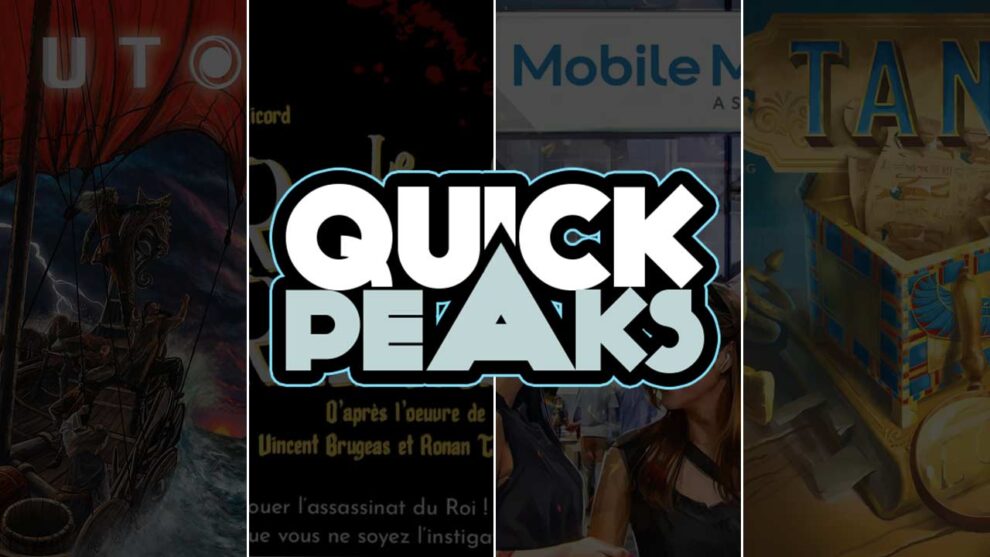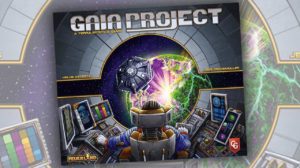Utopia – David Wood
What would it be like to go back in time and change history? That’s the premise of Utopia. Except rather than trying to change the past to make things better in the future, you’re a megalomaniac Time Lord trying to create your warped vision of the future. Players recruit famous people from history to pilot their chronoships to different eras where they gain knowledge, obtain technologies, and recruit more chronoship pilots. These are used to complete butterfly effect missions that will alter the timeline. The first player to complete 3 butterfly effect missions wins the game.
Utopia is easy to learn, quick to play, with a good deal of player interaction as they vie to place their chronoships in the different time zones. Players can even assassinate other players’ chronoship pilots, but with the ability to time travel, no one ever truly dies. The components are very good and the game comes with an insert for storing everything neatly (no baggies!). The game also comes with a mini-expansion and both a solo and a co-op mode. Kudos too for the designer who was very responsive to the few rules questions we had.
Ease of entry?:
★★★★☆ – The odd bump or two
Would I play it again?:
★★★★★ – Will definitely play it again
Read more articles from David Wood.
Le Roy des Ribauds – Justin Bell
Matagot is working on a number of “micro game” publications styled in the Button Shy mold of wallet-sized, 10-minute games. Le Roy des Ribauds (which will be released wide in 2024) is based on a comic series created by Vincent Brugeas and Ronan Toulhoat, featuring kings, queens, knights and assassins. In the game (designed by Erwann Ricord), two players compete to achieve one of the three win conditions using a small hand of three cards: possess three queen cards at the start of their turn, end a turn with two face-up assassins in the market row surrounding another face-up character card, or end a turn with three face-up kings in the market row.
Cardplay here is clever, as players use the powers of the four card types to flip cards face-up or face-down, look at the opponent’s hand, or try to play a version of The Shell Game by moving face-down cards around when only you know a card’s identity. And games are fast–the package says games should last 10 minutes, and in my experience across three plays, that is very accurate.
That also means Le Roy des Ribauds is so short that you might leave the table feeling like nothing particularly meaningful happened. I’m all for games that are shorter, sure. But I’m a little worried about the recent activity of turning games that play in an hour into 15-minute roll-and-writes or 20-minute tableau builders. Micro games that last 5-10 minutes veer very close to the line of “not enough game here”, as my wife noted after our final play of this one. As a filler between food courses at a restaurant, though? Le Roy des Ribauds is a winner.
Ease of entry?:
★★★★★ – No sweat
Would I play it again?:
★★★☆☆ – Wouldn’t suggest it, but would happily play it
Read more articles from Justin Bell.
Mobile Markets: A Smartphone Inc. Game – Andy Matthews
Over the past 8 months or so I’ve been playing a lot of Smartphone Inc. with my gaming group. It’s a tight phase-based economic game which has players producing mobile phones, developing cutting edge technology, expanding into other countries, and trying to dominate the cellphone market.
Some folks call Mobile Markets a “card based” version of Smartphone, and while that’s a fair assessment, it’s not a complete one. It’s better to say that Mobile Markets is a brand new game which maintains much of the same flow as Smartphone, but introduces a number of new elements like Marketing, production costs, and individualized customer sales.
Mobile Markets actually offers a bit more complexity than the base game since you not only have to worry about expansion and adding tech to your phone, but you also have to balance end game scoring thanks to Technology and Marketing cards. In addition, you have to fine-tune your product to the current market of public, and even, private customers. Be aware that Mobile Markets is a table hog due to the multiple decks of cards, but the end result is quite satisfying.
Ease of entry?:
★★★☆☆ – There were a few questions
Would I play it again?:
★★★★☆ – Would like to play it again
Read more articles from Andy Matthews.
Tanis – David McMillan
Tanis is a new offering from game designer extraordinaire Phil Walker-Harding. In this two-player game, the players take on the roles of explorers unearthing a cache of documents in an Ancient Egyptian tomb. Thematically, the players are digging through the box trying to piece together the scrolls contained therein? I guess? The theme in this game is pretty absent, the Ancient Egyptian hieroglyphs serving as more of an aesthetic than anything else.
In Tanis, the players are trying to extract numbered domino-like tiles from a box to create running sets. The larger the run, the more points the set will score. Each tile contains two pieces of information: a number and an icon which corresponds to the tile’s color. At the start of the game, the only tiles that are visible are the ones on top of the stack, but new information is revealed on the tiles further down in the stack as tiles are collected by the players.
To assist the players in their tile-collecting efforts, they are each provided identical decks of six cards which they can play on their turn in order to manipulate the tiles in the box, either making the tiles beneath easier for them to get to, or obfuscating tiles they want to keep out of their opponent’s hands. Once all the tiles are collected, the players tally up their scores to determine the winner.
The basic game is fine, but Tanis really takes off once the players begin playing with the deck of advanced cards, which replace the basic cards with more powerful versions of themselves. Clever and quick, Tanis was a very enjoyable experience and I look forward to many more plays in the future.
Ease of entry?:
★★★★★ – No sweat
Would I play it again?:
★★★★★ – Will definitely play it again












Add Comment